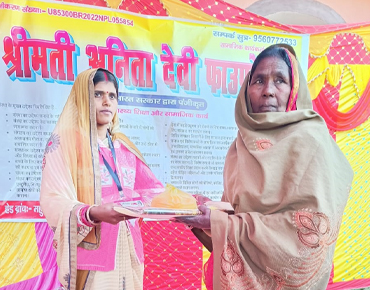India’s most trusted non profit organization

The Importance of WOMEN EMPOWERMENT?

What if the key to unlocking economic potential in rural India lies in women empowerment? While they play a vital role in driving the local economy, many women continue to grapple with an unfair division of labor that stifles their growth and well-being. This article investigates the ongoing struggle for gender equality and the importance of women empowerment in achieving sustainable development. We will highlight inspiring efforts by leaders such as Shrimati Anita Devi, who are committed to dismantling the barriers that limit women’s participation and enhancing their voices in the decision-making process.
Shrimati Anita Devi Foundation is driving initiatives to reduce the ‘time poverty’ and drudgery of ladies, provide them with access to economic opportunities and enable their participation in decision-making, so that they become equal partners in the development process.
OUR INTERVENTIONS
Helping women find their voice is deeply empowering and has a ripple effect on families and society. Shrimati Anita Devi believes that ladie’s issues cannot be addressed in isolation but within their social and institutional milieu. Women’s representation is crucial in social, political and economic processes for a thriving society.
Whilst gender is a cross-cutting theme across all our activities, specific initiatives aimed at women are:
self help groups
capicity building &drudgery reduction
woman enterprided development
1. EDUCATION
Girls and women face many barriers to progress and equality that education can help overcome. Without access to quality education, women may marry too young, work in low-paying informal employment and depend on their partners or families for financial support.
By prioritizing education, we can empower women to pursue their own goals and aspirations and reach their full potential. Furthermore, educated women are more likely to invest their income back into their communities and families, creating a positive ripple effect. Learn how Adjara Group supports gender equality with Women’s Empowerment Principles (WEPs), signing on to their CEO Statement of Support to advance gender equality within our workplace, marketplace and communities.
2. HEALTH
Women can use health as an avenue to empowerment, as it allows them to take control of their own wellbeing and increase confidence. Education on topics ranging from reproductive health and chronic disease is crucial as it empowers women to seek second opinions and participate in medical decision making processes – ultimately improving overall results and satisfaction with healthcare services.
This study revealed four themes describing how seeking health information empowers women: management of health concerns (including subthemes like better coping, stress management and situation control); lifestyle modification; promotion of preventive behaviors and self-protection.
Women Empowerment is an essential business goal and the basis for long-term sustainability. Join leaders from over 33,000 businesses who have signed the Women’s Empowerment Principles to advance gender equality within their workplace, marketplace and communities.
3. EMPLOYMENT
Ladies become more empowered when they gain access to employment and training, which can provide greater financial security as well as build resilience against environmental challenges.
Business leaders who recognize the significance of women’s empowerment must realize that one key way of supporting female employees in the workplace is through equal pay schemes that are free from bias, while also encouraging career advancement for both genders.
Women and men alike value flexible work options that enable them to combine caregiving responsibilities with career obligations. Such arrangements were especially vital during the pandemic, when many women left their jobs to care for loved ones. Women who benefitted from flexible working arrangements had greater levels of empowerment.
4. Self-Reliance
Self-reliance fosters healthy relationships based on equality and respect, encouraging women to seek opportunities for personal growth and development. Furthermore, it provides women the ability to take leadership roles within their communities that contributes to overall societal success as well as economic prosperity.
Woman participants described an intricate interplay between their inborn characteristics that could help them empower themselves and the compatibility of those characteristics with local gender norms. They found themselves caught between these innate attributes which could empower them and the need to respect husbands by publicly displaying these qualities.
Discover how you can prioritize gender equality and women’s empowerment within your bank’s work, marketplace and community by downloading the Equality Means Business Principles developed by UN Global Compact and UN Women.
5. Self-Esteem
Self-esteem fosters confidence, mental wellbeing and achievement. It allows individuals to maintain a positive outlook when faced with challenging situations while remaining open to feedback and possibilities for growth.
Individuals’ self-esteem levels may be determined by both genetic factors and early childhood experiences, but research shows that life experiences play a much larger role. Abraham Maslow termed this experience unconditional positive regard from others and an individual’s sense of inner worth are among the primary determining factors when establishing one’s esteem levels.
Women Empowerment strives to give woman more agency and decision-making power over their lives, restore lost value from prior oppressions, and promote social transformation for both themselves and society. Donate today to support this cause!
